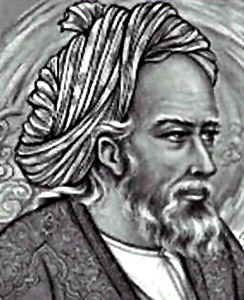Omar Khayyam, being considered to be one of the most important philosopher, scientist and practical instructors in Sufism, lived between the years of 1048-1131. The Persian poet, mathematician and astronomer, Khayyam was well renowned for his scientific achievements. Omar Khayyam was born to Ghiyath al-Din Abul Fateh Omar Ibn Ibrahim al-Khayyam in Nishapur, the capital city of Khurasan. Omar Khayyam got his education at his native town and he studied under the celebrated teacher, the Iman Mowaffak. After completing his study, Omar Khayyam started to attain knowledge on Sufism and soon became an ardent supporter of the philosophy of Sufism. Omar Khayyam mainly followed the path of poetry to spread his message of Sufism and he used poetry, quite effectively.
 The teachings of Omar Khayyam that are found in his poems and also those of the other members of his school that have become an accepted part of the Sufi material, are mainly based upon the special terminology and allegory of Sufism. Khayyam`s write-ups are popularly known as Rubaiyat. Khayyam was described as the poet of destiny. One would find two major schools of thought while trying to classify Omar Khayyam`s Rubaiyat. One of the schools claims that he was highly influenced by Islamic mysticism, and particularly Sufism. The other school of thought would refute the first completely and claim that Khayyam understood his mortality and inability to look beyond. Khayyam had the urge, the drive, and the discipline to compose and write the Rubaiyat and it shows that he also had a depth of perception and vision.
The teachings of Omar Khayyam that are found in his poems and also those of the other members of his school that have become an accepted part of the Sufi material, are mainly based upon the special terminology and allegory of Sufism. Khayyam`s write-ups are popularly known as Rubaiyat. Khayyam was described as the poet of destiny. One would find two major schools of thought while trying to classify Omar Khayyam`s Rubaiyat. One of the schools claims that he was highly influenced by Islamic mysticism, and particularly Sufism. The other school of thought would refute the first completely and claim that Khayyam understood his mortality and inability to look beyond. Khayyam had the urge, the drive, and the discipline to compose and write the Rubaiyat and it shows that he also had a depth of perception and vision.
Omar Khayyam clearly posed the questions of mortality and temporality of people`s existence. He also understood the meaning of not being in control of the lives and deaths, and found the limits of people`s freedom, as well. As he understood what was important in life, his teachings and his Rubaiyat conveyed that meaning, through his life. According to Omar Khayyam, it was the fate, destiny or something beyond the people`s control to be born into this world. He also said that death is an inevitable fate for anyone who has born.
Omar Khayyam`s Rubaiyat encourage the people to ask those ultimate existential questions and also lead them down a path that, which they must traverse. He said that those ultimate truths are love and joy, something all that matters in life. Everything else is fantasy and fallacy. Khayyam talked about the `secret` and said that the secret must be kept from all non-people. According to him, the mystery must be hidden from all idiots. Talking about the mankind, Omar Khayyam commented that the circle of this world is actually like a ring. He added that there is no doubt at all that the people are the Naqsha or the Design of its bezel. Khayyam said that the people either fear hell or dream of Paradise, in cell or cloister, but no man who really knows the secrets of his God, has planted seeds like this within his heart. Omar Khayyam also said that every clique has a theory about me and commented - I am mine; what I am, I am. Omar Khayyam described a new way of Sufi philosophy and his thoughts influence the thinkers of his contemporary period as well as the philosophers of this century.












